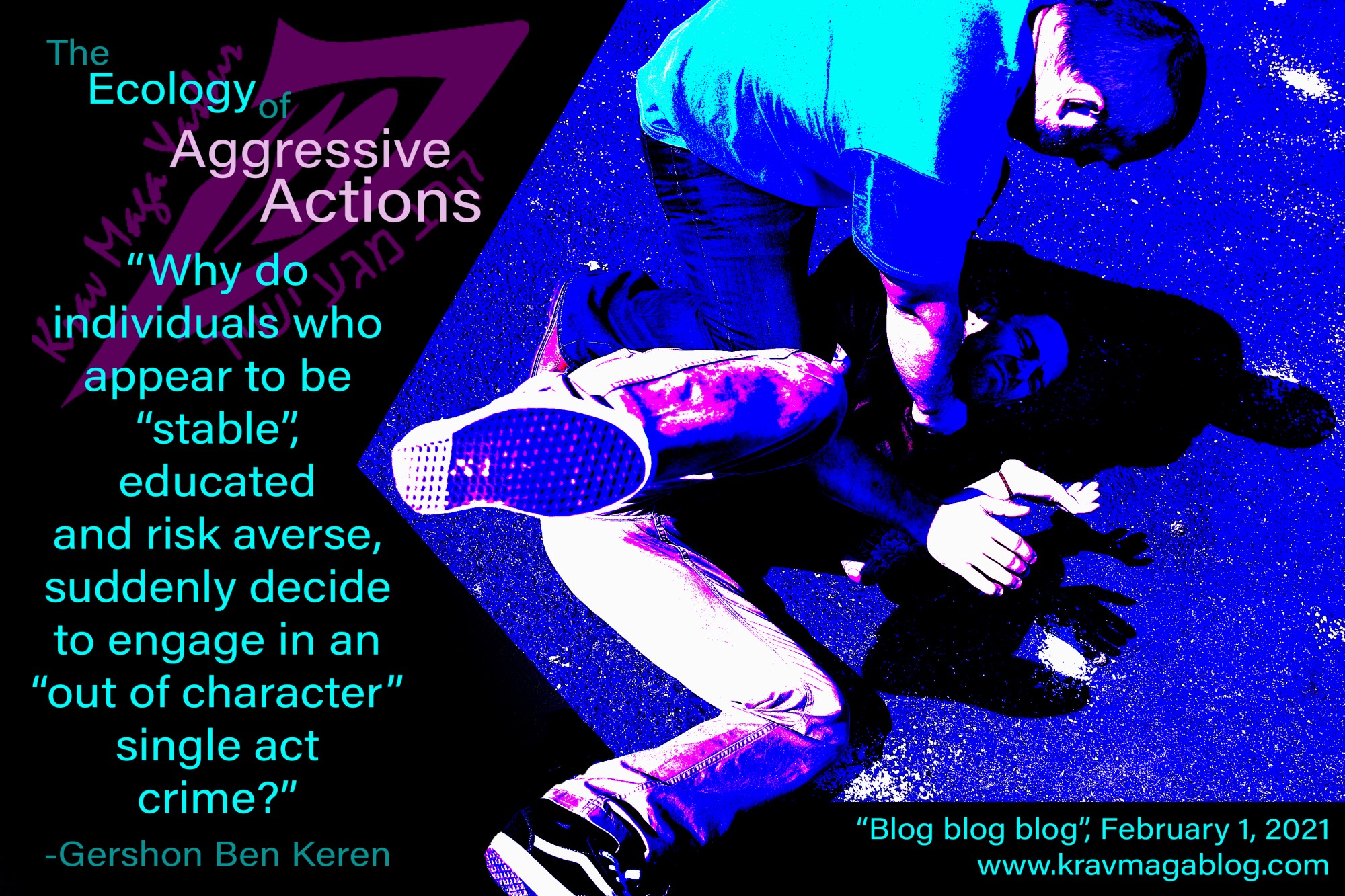Often when we look at, and study violence, we look at the internal mechanisms that people have – or lack – that cause them to become, and/or make them prone to being aggressive e.g., we look at low levels of self-control, the inability to correctly calculate risk, impulsiveness, and the need for excitement etc. and whilst these things may be contributing factors, they don’t explain the whole story, and may at times confound us e.g., why do individuals who appear to be “stable”, educated and risk averse, suddenly decide to engage in an “out of character” single act crime, such as shoplifting (here I’m talking about those individuals who engage in atypical theft behaviors, rather than kleptomania). If we are to simply try and understand crime and violence, based on the internal character of the individual, and exclude external factors that influence, encourage and in some cases trigger crimes and acts of violence, we aren’t going to be seeing the whole picture. This is where we need to look at the ecological factors that affect aggression and violence, and there are many. There are obviously individuals who go out looking to be involved in violent altercations, such as gangs of teenagers engaged in “recreational violence” who are looking for victims as sport, however for most people – including those predisposed to using violence – it is something in and/or about the environment that causes them to become angry and aggressive.
Dollard et al., (1939), proposed a frustration-aggression-displacement theory to explain this. Their theory suggests that aggression arises when a person’s goal(s) are blocked or frustrated. Although their original theory stated that aggression was the natural consequence of frustration, the theory was revised later to recognize that not everybody responds to frustration by becoming angry/aggressive, however all acts of aggression require some degree of frustration to them e.g., not everybody responds to being cut off in traffic with anger, however those who do, do so because their “goal” of getting to a destination was blocked – albeit temporarily – by the other driver, and so by becoming frustrated at the incident (possibly partly due to their helplessness in the situation) they react in an angry and aggressive manner. However, a person may not behave consistently in this way e.g., there may be times when a person reacts aggressively to being cut off, and other times when in a state of Zen calm, they sagely accept what has happened to them, and prefer not to see it as an injustice etc. This is probably true for most people; we don’t want to be the individuals whose egos are susceptible to such trivial acts, such as being cut off in traffic, but then there are times when we seem not to be able to stop ourselves from over-reacting in this way. This would suggest that other factors might be at play. Looking at this from an “external” rather than “internal” perspective, it could be that our car’s air-conditioning isn’t working and it’s an extremely hot day (we know that when people feel physically uncomfortable, they ae more likely to act aggressively) and/or our kids are in the back seat arguing loudly about some trivial issue – and if we combine these factors together, with the fact that we might be late to an appointment that it took us several months to get etc. we can start to see why being cut off, becomes the straw that breaks the camel’s back. Our normal internal Zen monologue, which gives the calm and rational narration and explanation to incidents involving traffic infractions – such as being cut-off - gets over-ridden by a multitude of external events, which frustrates our seemingly simple goal of getting to a destination on time.
Life can be stressful, and otherwise calm and rational people, can have bad days due to “external” factors in their life, and obviously there are those who have a predisposition towards acting aggressively when frustrated, whether it’s not being able to open a jar of something, or being refused entry to a pub/club, however it is the way in which they and the environment interacts with them that results in anger and aggression. When I used to work security in bars and clubs one of the biggest causes of aggression – that often led to violence - was the length of time people had to wait at the bar to be served (and this was in the UK where people were usually surprisingly good about queueing). It seemed that people had in their heads a length of time that was “reasonable” to wait to be served, however if the clock ran over on this, they became frustrated that they couldn’t accomplish what was a pretty simple goal of getting a round of drinks. If somebody then looked like they would get served ahead of them, even though they hadn’t been waiting as long, trouble would start to brew. In many ways, any anger should have been directed at the establishment i.e., the bar/club hadn’t enough staff to cope with demand, hadn’t implemented a fairer queuing system etc., however the “scapegoat” would be the person who looked like they would be served ahead of them, even if they hadn’t done anything too deliberate or overt – such as pushing in front – to cause this. For some people, at some times, frustration and aggression (especially where alcohol is concerned), needs to be directed somewhere, and that doesn’t need to be at the actual issue or problem. The frustration is at the situation, not any single person, but frustration and anger cannot be dispensed against something so complex and so must be directed towards an individual.
By considering how the environment, including other people in it, can have an effect upon anger and aggression, we can start to understand why a normally calm/rational individual gets caught up in rioting at a football match e.g., the anonymity of the group, the infectious excitement of mayhem and destruction etc. all go to influence the behavior(s) of the individual. There are of course “internal” reasons for acting aggressively and violently – we all know “angry” people – however to get a complete picture of violence, we also need to consider the ecological factors at play.
Share:

Gershon Ben Keren
2.8K FollowersGershon Ben Keren, is a criminologist, security consultant and Krav Maga Instructor (5th Degree Black Belt) who completed his instructor training in Israel. He has written three books on Krav Maga and was a 2010 inductee into the Museum of Israeli Martial Arts.
Click here to learn more.

